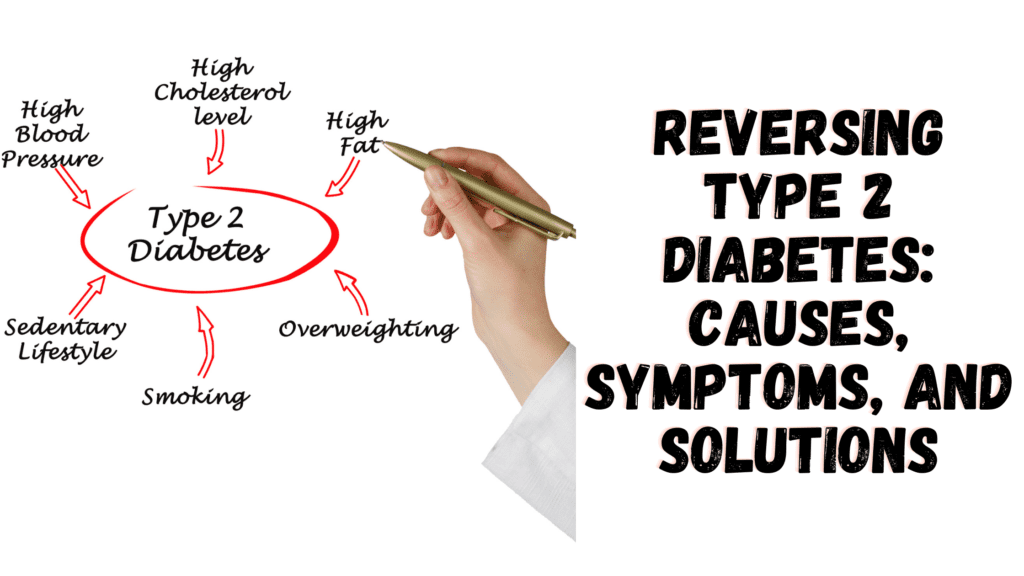
Table of Contents
Can I reverse my TYPE 2 Diabetes?
Have you been diagnosed with type 2 diabetes? The type of diabetes can potentially be linked to your diet, weight, lack of exercise or genetics. It’s becoming more and more common. In the early stages, Type 2 diabetes can go undiagnosed for years if not tested for or if symptoms are ignored or missed.
What is Type 2 Diabetes
Type 2 diabetes is a condition that is caused by the body having problems with a chemical in the body (a hormone) called insulin. As the insulin in your body is not working properly, the level of sugar (glucose) in the blood becomes too high. It can cause symptoms like excessive thirst, needing to urinate a lot and tiredness. It can also increase your risk of getting problems with your eyes, heart, kidneys, circulation and nerves. It’s a lifelong condition that can affect your everyday life.
Can I Develop Type 2 Diabetes
Anyone can develop type 2 diabetes but it mostly affects people over the age of 25; often with a family history. Type 2 diabetes doesn’t just affect people living with obesity, although this is one of the risk factors, your ethnicity also has a big impact.
Is There a Cure?
There’s no cure but some people with type 2 diabetes can put their diabetes into remission by losing a significant amount of weight and modifying their lifestyle. We call it remission rather than reversal because if the weight returns or the lifestyle changes back for whatever reason, then the insulin resistance returns. Remission is where the blood sugar levels are below the diabetic range and you don’t need to take diabetes medication anymore.
How can we do this?
We now have strong evidence that Type 2 diabetes can be put into remission by losing weight and changing your lifestyle.
The earlier you make changes after the diagnosis, the quicker the journey to remission but people who have lived with diabetes for many years are still able to put their diabetes into remission.
If you have obesity (which is a chronic illness in its own right), your diabetes is more likely to go into remission if you lose at least 15kg. This is not easy and we need to look at the potential reasons that led to the individual developing obesity. Without dealing with the underlying factors, most people are not successful in this journey. The individual may need medication along with support from health professionals to help lose this weight. The medication can be tablets, injections or weight loss surgery. It’s not as simple as “eating less and moving more”.
Everyone is different and it is important to know that not everyone who loses weight will be able to put their diabetes into remission. But losing at least 15kg has a lot of health benefits, even if this doesn’t lead to remission.
Why is it always about weight?
Carrying too much weight, fat, causes the body to store it in the liver, the pancreas (the place where insulin is made and released) and other parts of the body. This affects how the body releases insulin to manage the sugar in your bloodstream. The excess body fat also causes the cells to be less efficient in utilising the sugar at the cellular level due to insulin becoming less effective (insulin resistance) and this causes excess sugar in the bloodstream that leads to harmHow can I lose weight?
How can I lose Weight?
There are no hard and fast rules. You have to find a way that works for you and that fits with your lifestyle. This is where a conversation with an experienced clinician or a lifestyle medicine coach can help. It could be a Mediterranean diet, exercising more, a very low carbohydrate diet, fasting or a combination; it has to be tailored to your life and be sustainable long term.
What Else can Help?
Mental well-being: managing stress is essential in putting diabetes into remission. Stress releases hormones that trigger the flight or fight response leading to excess cortisol production. This can adversely affect the sugar balance. Practising mindfulness and meditation also helps address some of the reasons (stress, busy lifestyle, etc.) that can lead to inappropriate food choices.
Reducing harmful substances: we know that having high sugar levels in the bloodstream alongside smoking can increase the rate of damage to the cells. Alcohol also contains high calories that affect the sugar levels and impact your health. Most people also tend to consume more calorific or unhealthy foods when they have excess alcohol. Alcohol also has a depressing effect on your mental well-being and this can affect your ability to follow through with any plans to address the path to remission.
Healthy relationships:
Relationships play a vital role in how well we feel and in turn our overall health. Having good connections such as a friend or partner to exercise with helps reach goals quicker and keeps you motivated to maintain your success. Evidence supports improved performance in many activities when done with other people, especially in front of a group rather than when undertaking this as an individual.
Healthy eating:
There is a lot of evidence to show that highly processed foods and foods that are high in carbohydrates and sugars have a big impact on how our body handles sugar spikes. Swapping to more complex carbohydrates improves the release of sugars and in turn, improves how the body improves the uptake and utilisation of the sugars. Combining carbohydrates and sugars with fibre (vegetables) can also improve the way the body handles sugar release from the gut. There is a push towards an ultra-low carbohydrate diet and this might be suitable for some but does need a careful discussion and plan to be able to maintain the changes long term.
Sleep
Sleep is essential for the body, it is the process by which healing of the mind and body happens. Most adults need a minimum of eight hours of sleep, only a very few individuals can truly function on very limited sleep, it’s estimated that only 5-10% of the population can function on little sleep and not have any negative health impacts. Poor sleep can lead to poor sugar control as a sleep-deprived body and mind tends to crave unhealthy foods. The resulting tiredness also can impact exercise and the ability to burn calories resulting in more sedentary choices of activities. Sleep is also essential in repair, especially mopping up cancer-causing chemicals and reducing the formation of dementia-causing plaques in the brain. Adequate sleep will help manage your sugars, and cravings and repair the damage at a cellular level.
Physical Activity:
This is an essential component in helping your diabetes into remission. Increasing muscle mass by lifting weights will help improve the speed at which your body burns calories and in turn, utilise the sugars in a better way. Exercise and physical activity, especially outdoors, improve a sense of well-being and help maintain a healthy mind and body. It’s not all about jogging or running, a brisk walk, a cycle, or a swim all can be just as effective in helping you with your journey into diabetes remission.
Summary
We need to identify what has caused us to develop type 2 diabetes, some factors we can’t control (ethnicity) and others that we may be able to have an impact on (obesity). We need to get to the root cause of why people might have gained weight (trauma, low mood, poor access to healthy foods etc) and then work together to plan a way ahead that fits your individual lifestyle. One size doesn’t fit all and it’s not as simple as eating less and moving more. An individualised plan in essential in helping people put type 2 diabetes into remission. Armed with knowledge and determination, every individual has the potential to take charge of their health journey and make impactful changes. Embrace empowerment and discover a brighter, healthier future
References
If you are concerned about type 2 diabetes
Concerned about Type 2 Diabetes? If so, don’t hesitate to contact us at Extracellular for a thorough assessment and to discuss your options.
Thanks for Reading our Type 2 Diabets blog!
If you enjoyed reading this article, please check out our other Blogs





0 Comments